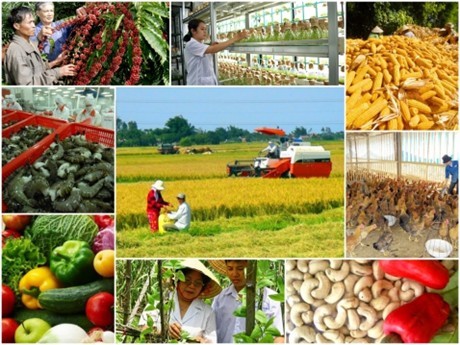(VOVWORLD) - Vietnamese lawmakers ratified the Vietnam-EU Free Trade Agreement (EVFTA) on June 8. The EVFTA’s strong commitment to tariff cuts will create a great opportunity for Vietnam to boost its exports to the European market, especially agro-forestry-fishery products, which are Vietnam’s competitive edge. On the other hand, the EVFTA will also require Vietnam to open its door to foreign goods, which means Vietnam’s agricultural sector will face challenges as well as opportunities on the path to global integration.
 (Photo: tapchitaichinh.vn) (Photo: tapchitaichinh.vn) |
The European Union is currently Vietnam's second largest importer of agro-forestry-fishery products, which are only available in 17 of the 27 EU member countries. The EVFTA opens the door for Vietnamese farm products to penetrate more deeply into the EU’s consumer market of 450 million people.
Nguyen Quoc Toan, Director of the Department of Agricultural Product Processing and Market Development, said, “Most of the 27 EU members need to import tropical produce and seafood, which are our competitive strengths.”
He took an example, “Last year Vietnam earned more than 11 billion USD from forestry products. Fruits, especially canned fruit, are another strength of Vietnam. Fruits like passion fruit and star apples are already being exported to EU as fresh or processed fruit.”
Under the EVFTA, almost all tariff lines on both sides will be eliminated. It will take the EU 7 years to gradually reduce to 0 all import duties for Vietnam. Vietnam has 10 years to gradually eliminate its tariffs. This is the most drastic commitment of any FTA Vietnam has ever signed.
But Vietnamese exporters will have to meet the strict requirements EU countries have imposed regarding product quality, food safety, and the identification of the origin of every agricultural product.
According to economist Nguyen Chi Hieu, “Europe is an extremely demanding market so it’s impossible for us to enter this market with commodities whose quality is much lower than theirs. Higher prices are not a big problem for Europeans, who are ready to spend money for higher quality goods whose origin and safety is documented. This is where Vietnam is still weak.”
European agricultural products do not directly compete with Vietnamese products. But foreign businesses will try to take advantage of the EVFTA to dominate processing which adds value to agricultural products and boosts their profitability.
Dang Kim Son, former Director of the Institute of Policy and Strategy for Agriculture and Rural Development, said, “If we don’t attract investment and build new processing plants in Vietnam, other countries will do it and get the added value while generating more jobs for their farmers.”
“What we want from European companies, as investment partners, is to work with us to apply technology, increase sales, and expand industry in Vietnam. The question is whether we will seize the new opportunities,” Son added.
The EVFTA will require Vietnam to compete with other nations that are stronger in technology and have higher quality products. Most Vietnamese agricultural enterprises are small businesses with limited resources and limited access to market information. Most Vietnamese enterprises export low quality raw materials, lack processing capacity, and are non-compliant with origin and intellectual property rights regulations.
Nguyen Dang Nghia, Director of the Tropical Agricultural Research and Consultancy Center, suggested, “First, we need to build brands for Vietnamese agricultural products that meet market standards. Second, we must improve the competitiveness of our brands. If we don’t find a way to meet these challenges, we’ll miss a great opportunity.”